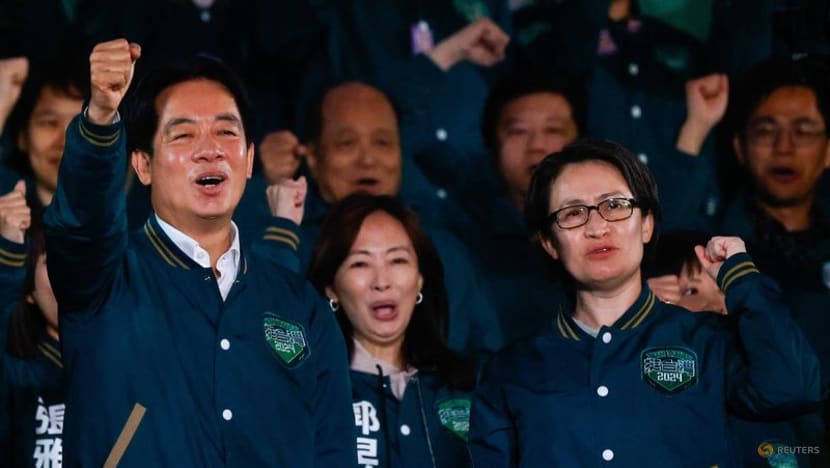Commentary: Taiwan’s 2024 election results show China isn’t voters’ biggest concern
In the short term, Beijing may be tempted to test the incoming DPP administration under William Lai Ching-te to see if it makes a mistake, says NUS political scientist Chong Ja Ian.

Taiwan President-elect Lai Ching-te of Democratic Progressive Party's (DPP) and his running mate Hsiao Bi-khim attend a rally following the victory in the presidential elections in Taiwan on Jan 13, 2024. (Photo: Reuters/Ann Wang)

This audio is generated by an AI tool.
SINGAPORE: The first major election in a year of polls across the world just came and went.
William Lai Ching-te of Taiwan’s Democratic Progressive Party (DPP) won the presidential poll, albeit with a plurality rather than the outright majority of votes it received in 2020, giving the party an unprecedented third consecutive term in office. However, the DPP lost the legislative majority it had held for the past eight years, although by a much smaller margin than initially anticipated.
Kuomintang (KMT), the largest opposition party in Taiwan’s Legislative Yuan, gained one more seat than the DPP - 52 to the DPP’s 51 - in this election, becoming the largest party in the chamber.
Another eight seats in the 113-seat chamber went to the relatively new Taiwan People’s Party (TPP) led by former Taipei mayor Ko Wen-je and two independent candidates.
ELECTION RESULTS A CULMINATION OF EVOLVING DYNAMICS
In many ways, the election results are a culmination of several dynamics that have been fermenting in Taiwan for some time and are somewhat unsurprising.
For starters, the campaign period for this election was very much less heated than previous ones and while the turnout rate was around a very healthy 70 per cent, it fell short of the high of almost 75 per cent from 2020. This reflects both a maturing of Taiwan’s democracy as well as an absence of the sense of urgency surrounding the China’s clampdown in Hong Kong.
Many voters in 2020 felt they needed a strongly pro-Taiwan administration and legislature to stave off Beijing’s efforts to control Taiwan. The 2024 presidential election revolved more around domestic issues like the cost of living, slow wage growth and the high cost of housing for the youth, and various local issues.
Driving these challenges are the global aftereffects from the COVID-19 pandemic and structural issues such as labour-employer relations, property development and land ownership, which are harder to resolve in the short-term. Nonetheless, incumbents will bear voters’ frustrations simply by virtue of being in office.
Corresponding with the emphasis on domestic issues is the receding into the background of the cross-strait relationship as an electoral issue. Beijing and the KMT tried to frame the election as a matter of independence or unification, war or peace, prosperity or stagnation. These binaries had little overall effect.
In the run-up to the election on Saturday (Jan 13), China placed restrictions on Taiwan exports of petroleum products to the mainland covered by the cross-strait Economic Cooperation Framework Agreement to increase pressure.
Alongside these developments were continuing Chinese military activity near Taiwan, including the launch of a satellite and at least several surveillance balloons. There was also alleged pressure on tycoon Terry Kuo to withdraw his candidacy in the presidential race to force an electoral alliance between the TPP and KMT, which came on top of alleged efforts to discredit the DPP on social media.
Such activity was a continuation of developments from before the election campaign period. They combined to create a sense that pressure from China is a constant rather than a variable. This normalisation of the challenge from Beijing reduced the electoral effects of pressure from China.
NEUTRALISATION OF CHINA AS AN ISSUE
A third related observation is that the neutralisation of China as an issue in Taiwan’s electoral politics may point to a shift in Taiwan political landscape. The KMT’s performance in the legislative election was led largely by its local factions, which focus on service delivery and constituency issues.
DPP and TPP supporters tend to identify more with Taiwan and feel more distant from China, even if this translates into different substantive policy preferences. Chinese political pressure and economic uncertainty are further accelerating Taiwanese businesses’ relocation and diversification from China, which is consistent with broader global trends.
Taiwan foreign direct investment (FDI) to Southeast Asia has been growing in recent years and outstripped FDI to China in 2023. These trends mean that direct pro-Beijing appeals may be facing a diminishing market in Taiwan politics.
For the KMT, which has been a key bridge to Taiwan for the Chinese Communist Party (CCP), they may need to decide if they want to continue being the Chinese Nationalist Party or a party for Taiwanese.
Going forward, developments in Taiwan spell a likely reconfiguration of domestic politics in Taiwan and ties with China. More than 80 per cent of people in Taiwan across multiple opinion polls over time want to maintain the status quo. Taiwanese voters will punish political parties who veer too far from this basic understanding, whether it is the Chen Shui-bian and the DPP in 2008 or Ma Ying-jeou and the KMT in 2016.
To the extent that Beijing continues to put pressure on Taiwan to accept its domination, especially overtly, it may discover decreasing traction in Taiwan. In the short term, the CCP may face temptation to test Taiwan’s incoming DPP administration to see if it makes a mistake that Beijing can exploit. Over the longer term, China’s direction of travel may face substantial challenge.
Chong Ja Ian is Associate Professor of Political Science at the National University of Singapore and a non-resident scholar at Carnegie China.

















